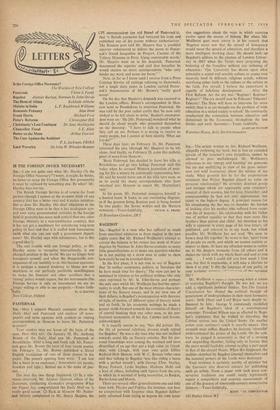SIR,—The article written ny Mr. Richard Wollheim, allegedly reviewing my
book. but in fact an extended parade of the reviewer's own prejudices, cannot be allowed to pass unchallenged, Mr. Wollheim's references to my 'energy and learning' are generous but are not mollifying in view of his gross unfair- ness and wild inaccuracy about the subject of my study. What grounds has he for the preposterous statement that Walter Bagehot placed no value on personal relationships? He certainly despised gossip and intrigue which are apparently your reviewer's concept of their essence, but for love. friendship. and companionship he had not only appreciation. but talent in the highest degree. A principal reason for his abandoning the Bar was to shoulder the burden of looking after his mother who suffered from recur- rent fits of insanity : his relationship with his father was of perfect equality so that they were more like brothers than parent and child : his devotion to his wife is apparent in every page of his love letters, all published, and referred to in my book, but which possibly Mr. Wollheim has not read. 'We seem to have a deep life together,' he wrote to her, 'apart from all people on earth, and which we cannot explain or impart to them. At least my affection seems to isolate me in the deepest moments from all others and it makes me speak with my whole heart and soul to you only. . . . I wish I could tell you how much I love you, but that is impossible, it will take a lifetime to show it to you.' Is.this the language of one guilty, as your reviewer „..thrncrsonal life'?
Mr. Wollhenn wnen it comes to 'assessing Bagehot's thought. He was not, we are told, a significant political thinker. Yet The English Constitution has shaped the political thought of generations of undergraduates in their most formative years: both Dicey and Lord Bryce were deeply in- fluenced by him : George V consciously modelled himself on Bagehot's ideal of a constitutional sovereign : President Wilson was so affected by Bage- hot's arguments that he wished to introduce the Cabinet system into 'the United States. On smaller points your reviewer's touch is equally unsure. One example must suffice. Bagehot. he declares, 'absurdly' underestimated the power of the Lords. On the con- trary, he gauged it accurately as that of a revising and suspending chamber, failing only to foresee that the peers would foolishly attempt to play a part equal to that of the elected House. When this happened, the realities sketched by Bagehot asserted themselves and the nominal powers of the Lords were destroyed.
Your reviewer is certainly worthy of stricture but the Spectator also deserves censure for publishing such an article. From a paper with such great con- servative traditions one could surely legitimately expect a sympathetic and accurate reassessment of one of the greatest of nineteenth-century conservative thinkers.—Yours faithfully,


































 Previous page
Previous page